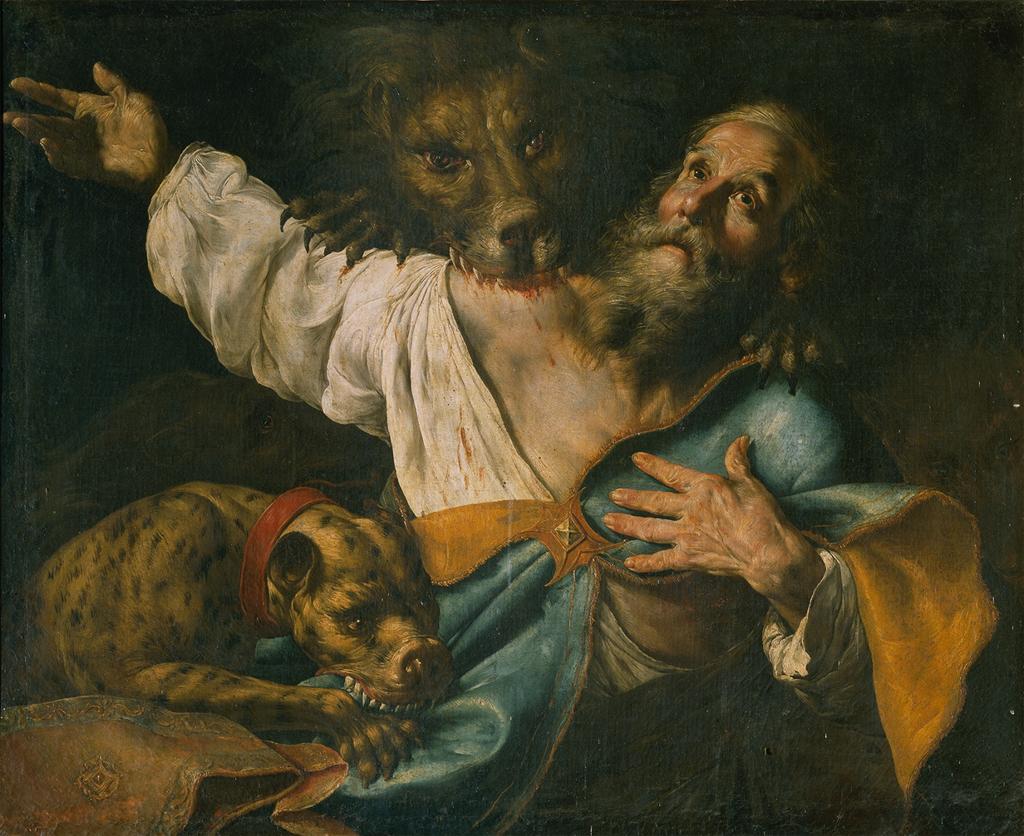Saint Ignatius of Antioch
Feast Day: October 17
Saint Ignatius, Bishop of Antioch, was the disciple of Saint John the Evangelist. Believing that the Church on earth should resemble that of the heavenly Jerusalem of which Saint John wrote in his Apocalypse, he established singing in choirs in his church at Antioch, after a vision of the celestial choirs who sang in that manner. When the emperor Domitian persecuted the Church, Saint Ignatius obtained peace for his own flock by fasting and prayer, although for his own part he desired to suffer with Christ, and to prove himself a perfect disciple.
The Roman emperors often visited Antioch, one of the cities of first importance of the empire. In 107, the eighth year of the reign of the emperor Trajan, he came to Antioch and forced the Christians to choose between apostasy and death. Saint Ignatius, who had already governed that church for forty years, continued to fortify it against apostasy, and did not flee. Arrested and brought before the emperor, the latter addressed him: Who are you, poor devil, to set our commands at naught? Call not poor devil, Ignatius answered, one who bears God within him. And when the emperor asked him what he meant by that, Ignatius explained that he bore in his heart Christ, crucified for his sake. Change your ideas, and I will make you a priest of the great Jupiter, and you will be called father’ by the Senate. What could such honors matter to me, a priest of Christ, who offer Him every day a sacrifice of praise, and am ready to offer myself to Him also? To whom? To that Jesus who was crucified by Pontius Pilate? Yes, and with whom sin was crucified, and the devil, its author, vanquished.
The questions and the courageous replies continued for a time that day and also on the following one. Saint Ignatius said, I will not sacrifice; I fear neither torments nor death, because I desire to go quickly to God. Thereupon the emperor condemned him to be torn to pieces by wild beasts in Rome. Saint Ignatius blessed God, who had so honored him, binding him in the same chains as Paul, His apostle. When his people wept, he told them to place their hope in the sovereign Pastor, who never abandons His flock. On passing through the city of Smyrna, he exhorted the faithful, who were grieved at his fate, to remain true to Christ until death, and he gave some of them who were going to Rome a letter for the Christians of the capital of the Christian world. This letter is still extant. He writes: I fear your charity, I fear you have an affection too human for me. You might prevent me from dying, but by so doing, you would oppose my happiness. Suffer me to be immolated while the altar is ready; give thanks to God… If when I arrive among you I should have the weakness to seem to have other sentiments, do not believe me; believe only what I am writing to you now. This letter of Saint Ignatius has encouraged all generations of Christians in their combats.
He journeyed to Rome, guarded by soldiers, and with no fear but of losing the martyr’s crown. Three of his disciples, who accompanied him and were eyewitnesses of the spectacle, wrote the acts of his martyrdom: His face shining with joy, he reassured them as the lions were released, saying: I am the wheat of Christ, I will be ground by the teeth of the beasts and made into flour to be a good bread for my Lord Jesus Christ! He was devoured by lions in the Roman amphitheater. The wild beasts left nothing of his body except a few bones, which were reverently treasured at Antioch until their removal in the year 637 to the Church of Saint Clement in Rome. After the martyr’s death, several Christians saw him in vision, in prayer to Christ, and interceding for them.
Reflection. Ask Saint Ignatius to obtain for you the grace of profiting by all you have to suffer, and rejoicing in it as a means of likeness to your crucified Redeemer.
Patronage
The Church in the Eastern Mediterranean and North Africa
Source: sanctoral.com

Birthplace
Born
1st Century AD
Syria
Death
Approx. AD 108-140
Rome
Canonized
Pre-Congregation
Shrine/Relics/Tomb
Basilica of San Clemente
Rome, Italy
Learn more:
Catholic Answers
Apologetics with St. Ignatius of Antioch – Catholic.com
Dec 13, 2023 — There is a literary relationship between Matthew and Mark that can help us determine when Matthew was written…
Vatican News
St. Ignatius of Antioch – A Precious Link to the Apostles – VaticanNews.va
For the Christians of the first and early second centuries, Christianity was like an explosion of light not only in the world but in their lives. It was new life, something so unexpected and undeserved…
